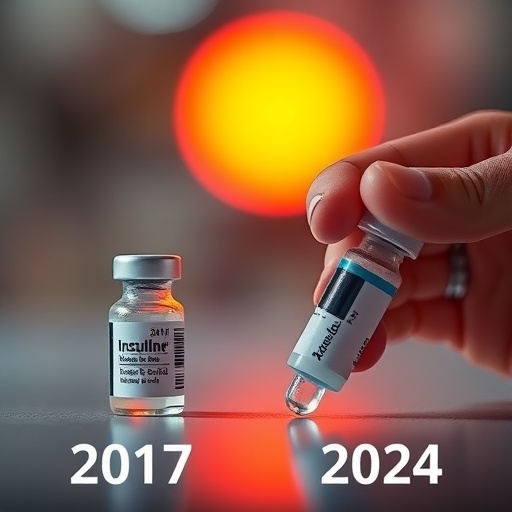In a striking continuation of a troubling trend, a recent study reveals that insulin rationing remains a pressing issue for many diabetic patients, even in the wake of substantial policy changes aimed at improving access to insulin. Conducted by Khan et al., this research provides a detailed analysis comparing the state of insulin accessibility in 2017 and 2024, highlighting that the crisis has not only persisted but may have even worsened. This is alarming news for public health advocates who have anticipated that policy reforms would alleviate the suffering of countless individuals reliant on this life-sustaining medication.
The findings of this study are drawn from repeated cross-sectional studies that present a stark reality: lives are still being put at risk by the decision to ration insulin due to financial constraints. The research underscores the socioeconomic factors that precipitate this rationing, where the high cost of insulin continues to outpace the affordability for a substantial percentage of the population managing diabetes. The disparities in accessibility present not only a health crisis but also an ethical dilemma that challenges the very foundations of health equity.
An analysis of the changes made to health policies over the past several years reveals that although there have been efforts aimed at curbing the exorbitant costs associated with insulin purchases, these legislative measures have fallen short of their intended goals. The researchers meticulously catalog changes in insurance coverage, state laws, and local subsidies designed to ameliorate the financial burden on patients. Despite these efforts, the study shows that a significant segment of patients still engage in rationing insulin either by skipping doses or reducing their intake, which can lead to severe hyperglycemia and other complications.
Further exploration into the demographic data reveals that certain groups are disproportionately affected by this ongoing issue. Patients from lower socioeconomic backgrounds and those without comprehensive health insurance are particularly vulnerable. Moreover, the study indicates that geographic disparities also play a role; individuals residing in rural areas often find it more difficult to access healthcare facilities that can prescribe or provide assistance with insulin management.
The implications of these findings are particularly harrowing when considering the long-term health effects of sustained insulin rationing. Chronic uncontrolled diabetes can lead to serious health complications such as neuropathy, kidney disease, and cardiovascular problems. Moreover, the emotional toll on affected individuals and their families cannot be understated. The anxiety associated with managing a chronic illness while grappling with limited financial resources creates a multifaceted crisis that extends beyond mere health outcomes.
In juxtaposition to these findings is the broader context of healthcare policy in the United States, where the complex interplay of insurance systems, pharmaceutical pricing, and patient advocacy significantly influences the lives of millions. The study by Khan et al. contributes valuable insights into this dialogue, and calls into question the efficacy of current reform measures. As policymakers regroup and assess the impact of their initiatives, the voices of those living with diabetes must remain at the forefront of conversation.
Encouragingly, there has been a growing movement towards more patient-centered approaches to healthcare that seeks to address systemic inequalities. Strategic partnerships between healthcare providers, advocacy groups, and policymakers can pave the way for more effective solutions. The research promotes the importance of continued advocacy and awareness to ensure that insulin remains accessible to everyone who needs it, regardless of their economic situation.
Looking toward the future, it is essential for researchers to continue monitoring this issue, as the data collected over the years can shed light on effective intervention strategies. Longitudinal studies that delve deeper into the experiences of patients who ration their insulin could uncover critical factors and health outcomes that merit further investigation. Building a robust body of evidence will be instrumental in shaping policy that genuinely prioritizes the health of patients over profits.
The study serves as a clarion call for urgent action, demonstrating that while progress has been made, there remains a significant gap between policy intent and lived reality. It is not enough to merely propose reform; tangible outcomes and improved patient health must be the benchmarks for success. Stakeholders at every level must prioritize collaborative efforts to eradicate the preventable tragedy of insulin rationing.
In summary, the study presented by Khan et al. outlines a compelling narrative that juxtaposes hope against the stark reality of ongoing insulin rationing. While policies may be evolving, the conclusive evidence suggests that these changes have yet to translate into meaningful relief for those who need it most. As society grapples with this public health crisis, it is crucial for everyone involved to hold fast to the principle that access to essential medication should not be a privilege dictated by one’s financial status but rather a fundamental human right.
As the ramifications of insulin rationing extend far beyond individual patients, the interconnected web of healthcare, economics, and social justice becomes increasingly clear. We must remain vigilant in our pursuit of equity in health access and continue to listen to the experiences of those affected. A concerted effort to address these challenges will ultimately serve not just individual patients but uphold the integrity of the entire healthcare system.
Through this crucial study, Khan and colleagues have shed light on a dire health issue that impacts millions and emphasizes the necessity for continued advocacy, research, and reform. As the dialogue surrounding insulin accessibility unfolds, the lessons learned from these findings will be integral in shaping the future landscape of diabetes care and policy reform.
Subject of Research: Insulin Rationing
Article Title: Insulin Rationing Persists Despite Policy Changes: Repeated Cross-Sectional Studies, 2017 vs 2024
Article References:
Khan, S., Rahman, N., Nally, L.M. et al. Insulin Rationing Persists Despite Policy Changes: Repeated Cross-Sectional Studies, 2017 vs 2024.
J GEN INTERN MED (2025). https://doi.org/10.1007/s11606-025-09886-9
Image Credits: AI Generated
DOI: https://doi.org/10.1007/s11606-025-09886-9
Keywords: insulin rationing, diabetes, healthcare policy, access to medication, health equity, socioeconomic factors




